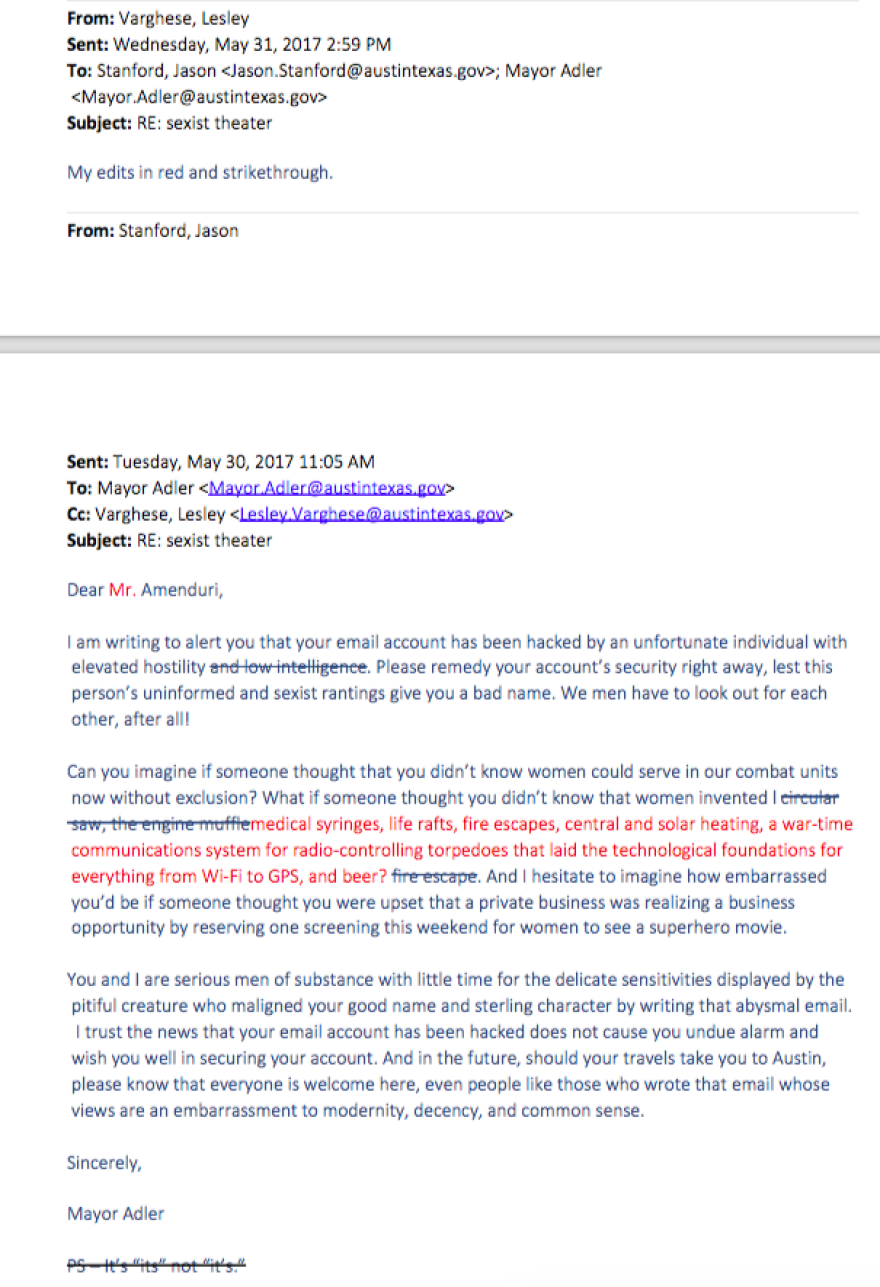After Austin Mayor Steve Adler’s response to a sexist emailhis office received went viral, he began fielding calls to run for president. As someone who has covered the mayor for most of his time in office, I was struck by how different the tone of the response was from his in-person demeanor, which is more subdued, measured and diplomatic.
In an age when the U.S. president appears to be his truest self on social media, Adler's online presence often departs from his in-person one. On Twitter, he's often snarky and pithy. Here are three responses tweeted from his account while he was leading a public meeting.
On April 26, while Adler was in a budget work session, this was tweeted from the mayor's account:
Settle down, Beavis. https://t.co/EQVm68OtBo
— Mayor Adler | 😷wear a mask. (@MayorAdler) April 26, 2017
.@statesman imagines @mayoradler as a woman. I seriously cannot even https://t.co/oqdBNI0rHN
— Evan Smith (@evanasmith) April 26, 2017
On April 13, the mayor was hearing about the city's Strategic Housing Blueprint during a council meeting when this was tweeted from his account:
Nolan, all the critics love you in New York.
— Mayor Adler | 😷wear a mask. (@MayorAdler) April 13, 2017
While he was in a City Council work session on Dec. 13, this came from his official Twitter account:
*cough*CriticsPickAsBestDragMotherin @AustinChronicle'sbestofAustin2016
— Mayor Adler | 😷wear a mask. (@MayorAdler) December 13, 2016
*cough* https://t.co/jQmxN0RUIu
Meanwhile, here's a sound clip of Adler from a recent press conference about the city's lawsuit challenging Senate Bill 4:
Perhaps the greatest example of this disparity is the mayor's recent snarky response to an email about women-only showings of Wonder Woman. But Adler did not write the celebrated tongue-in-cheek piece, which insisted that the only plausible explanation for the author's sexism and anger had to be that his email account was hijacked.
According to emails obtained by KUT News, that response was written -- perhaps unsurprisingly to people familiar with how politics works -- by the mayor’s communications director, Jason Stanford. Adler did little more than OK the piece. Here’s how it went down:
On May 26, an email from Richard A. Ameduri made its way to Adler’s chief of staff, Lesley Varghese, with the subject line “sexist theater.” In it, Ameduri complained about the Alamo Drafthouse hosting several women-only showings of Wonder Woman and called women a “second rate gender.”

Three days later, Varghese forwarded the email to Adler and Stanford. (Note a woman encouraged him to respond.)

Stanford agreed. But the mayor needed more context:

Stanford sent him a link to the story about the Drafthouse’s women-only screenings. According to emails, an hour later Adler then gave his only editorial direction on the piece.

Eighteen hours later, Stanford circulated a first draft.

Varghese had a few minor edits. She removed the grammarian’s postscript. She also nixed most of the inventions Stanford mentioned and added stronger examples, including WiFi and beer.

About an hour and a half later, Stanford forwarded this second version (what would become the final, and much lauded, version) to Adler, asking “Mayor: What say you?”
“Okay,” Adler wrote 40 minutes later.

None of this surprises a former speechwriter.
“I remember my parents first asking me, ‘Why don’t you get credit for the speeches you write?’” said Jenifer Sarver, a communications consultant and former speechwriter for U.S. Sen. Kay Bailey Hutchison.
“Just as I wouldn’t expect a senator, a secretary of commerce or a mayor to be a perfect speechwriter, I wouldn’t expect them to know all the best policies, and all the best information," she said. "I would expect them to find people who can get that information for them so they can do their job of governance.”
Sarver said it’s important to make sure that what you write sounds like the politician you’re writing it for – but sometimes you have to push them.
“If your job is to try to make something memorable … sometimes you have to be a little bit more edgy,” she said. “And that is not the default of any elected official to be edgy. ... There are times when you have try to push them a little bit to get outside that comfort zone. But you better be confident that what you’re doing is going to be effective and always authentic to who they are, always accurate, always truthful, always factual.”
When a KUT reporter asked Stanford to talk about the process of writing this response, he said: “There is no way on God’s green earth I would do this interview.”
When the same reporter asked Adler who wrote the email, he said: “Like a lot of things in this office, it’s teamwork. There were other people that were involved more than just one. There were a lot of eyes on it and a lot of people trying to help.”





